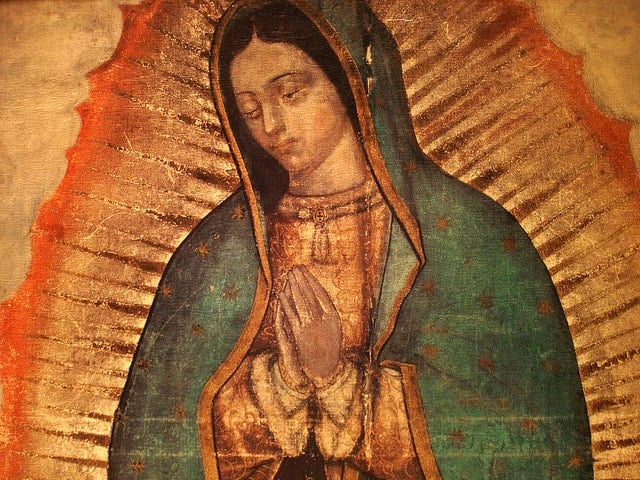Haga clic aquí para español.
Today marks the Feast of Our Lady of Guadalupe. With an estimated 20 million visitors annually, the Basilica in Mexico City – where this famous Marian apparition occurred – is the most-visited Catholic pilgrimage site in the world. No day is bigger than today. Thousands of pilgrims are parading for miles throughout the streets of Mexico City, many advancing step by step on their knees.
Meanwhile, Catholic parishes throughout the U.S. are also celebrating, especially those parishes with a large Latino population. In fact, the United States Conference of Catholic Bishops (USCCB) announced today’s feast as a day of prayer and solidarity with families of immigrants. So it’s worth reflecting on what we as Americans can learn from this popular devotion, especially this year as we digest the election season and the attention placed on immigrants from our southern neighbors.
After all, President-elect Donald Trump wants to make America great. It’s an admirable goal that most can agree on: we want our country to be great. Now what exactly does that mean? Let’s look to lessons from Our Lady of Guadalupe.
First, a quick refresher on the story: in 1531, the Virgin Mary appeared to a young native Mexican peasant named Juan Diego. To provide evidence of the appearance, Mary filled Juan Diego’s tunic with out-of-season roses. When he released the pile of roses in front of the local archbishop, a captivating image of Mary was revealed on his tunic: a dark skinned woman wrapped in a star-covered mantle, standing on a crescent moon and carried by an angel. This original tilma continues to be prominently displayed behind the altar at the Basilica in Mexico City for the millions of pilgrims who come to visit and pray.
So what does Our Lady have to teach us about how our Church can help make America great?
1. We all belong and deserve respect.
Mary appeared to Juan Diego as a mestiza woman with a darker skin tone. Contrasting with the typical white-skinned Christian images brought over by European missionaries, this image of Mary had a transformative effect. Waves of conversions among indigenous Mexicans followed the apparition. If we tally conversions, this apparition was more successful than years of efforts by boatloads of missionaries.
Why did it have such a transformative effect? Because indigenous people could identify with this image of Mary. She even spoke to Juan Diego in his native language of Nahuatl. Mary came among them, as one of them. It gave the local people a sense of belonging.
The U.S. Church needs to reinforce this sense of belonging today to make our country great. Fellow Catholics should not feel like outsiders within our churches. This includes those who are immigrants to our country, documented or not.
Unwelcoming or hateful rhetoric toward immigrants or others degrades their personhood. While most would agree that our country needs to work on its policy and the actions it takes in regards to immigrants, our churches must stand as welcoming spaces. Migrants to the U.S. are typically fleeing situations of violence, distress, and economic hardship to make an arduous journey in the hope of a better life.
And life rarely gets easier on arrival in the United States. Immigrants face prejudice on a daily basis, regardless of their legal status. How is our Church complicit in this? How can we be more inclusive and more welcoming?
We need to be a country of belonging and respect to be a great country.
2. The poor and marginalized deserve a voice.
Mary appeared to Juan Diego, a native-born peasant. She didn’t appear to the bishop, nor the colonial rulers. In fact, she visited Juan Diego four times, and her only other appearance was to his bedridden uncle.
The poor, the sick, and indigenous communities deserve attention and support. They deserve a voice in our country if we want to be great.
We continue to see the economic divide widen as inequality grows in our country. Support for both Bernie Sanders and Donald Trump drew significantly from Americans upset at the economic system that has left stagnant wages for the lower and middle classes, while facilitating income gains to the super rich.
The sick are also treated as outcasts, especially when a diagnosis arises in an unborn child. Babies with Down Syndrome are aborted at alarming rates. Broader abortion access has been discussed as a way to counteract the Zika virus outbreak and its connection with microcephaly.
To see the oppression of indigenous communities, we need to look no further than North Dakota, where protesters to the oil pipeline were being violently attacked a few weeks ago.
We as a Church need to remember our preferential option for the poor, which includes the economically struggling, the unborn child, and native peoples. If the moral test of a society is how the most vulnerable are treated, are we passing that test? How are the voices of the marginalized spoken and heard in our country? How is our Church working to amplify their voices?
We need to listen to these voices to be a great country.
3. We are in this together.
Our Lady of Guadalupe is beloved and revered in Mexico, but Pope Pius XII gave her the broader title “Patroness of the Americas,” which subsequent popes have reiterated. Let this serve to remind us of our common interests and the common good.
Whether we are referring to migrants in our communities or other countries in our region, we should give more thought to what honestly constitutes the common good.1 To be great, our country needs to be concerned with the good of all others, not just American citizens. Isolationist thinking or combative approaches to neighboring countries in a spirit of U.S. American-exceptionalism run counter to this message.
Even less controversial policies against migrants, like deporting all convicted criminals, can have devastating effects outside of the U.S. One component of the gang and drug violence ravaging Central America traces directly back to the deportation of convicted felons in the U.S. in the 1990’s. The United States deported not just the convicted felons, but also the accompanying drug and gang culture, into countries poorly equipped to handle this influx.
Remittances (or money sent back to a home country) from immigrants living in the U.S. push literally billions of dollars annually into struggling economies through the hands of the poor and middle classes. Lost remittances from deportation or increased taxes on this form of cash flow could have significant ripple effects across the Americas.
Our attention to the poor and unemployed members in our own community cannot be provided as an excuse to overlook the needs of others. We are in this together, and we are called to build the common good. How can we as a Church work on building bridges instead of walls?
We need to care about making a greater world if we want to be a great country.
*****
The story of the apparition of Our Lady of Guadalupe might be hundreds of years old, but the lessons we can draw from it apply to our lives today. If we want America to be great, we can start with these three lessons.
A great America will be a place where people are included and respected, where everyone feels like they belong. A great America will stand up for those most in need, including the poor, the sick, and marginalized social groups. A great America will work for the common good of all Americans, while also giving concern to the greater global good.
It is a tall task, but at least we have an intercessor. Our Lady of Guadalupe, Patroness of the Americas, pray for us.
***
Image courtesy Flickr CC user Sacred Heart Cathedral Knoxville.
- The common good is not to be simplified into the good for the greatest number of people. Rather, it challenges us to think about the good of others, and in fact all human persons, in the way we organize our society. To work for the common good, we have to get beyond thinking just “what is good for me” or even “what is good for the U.S.” ↩


